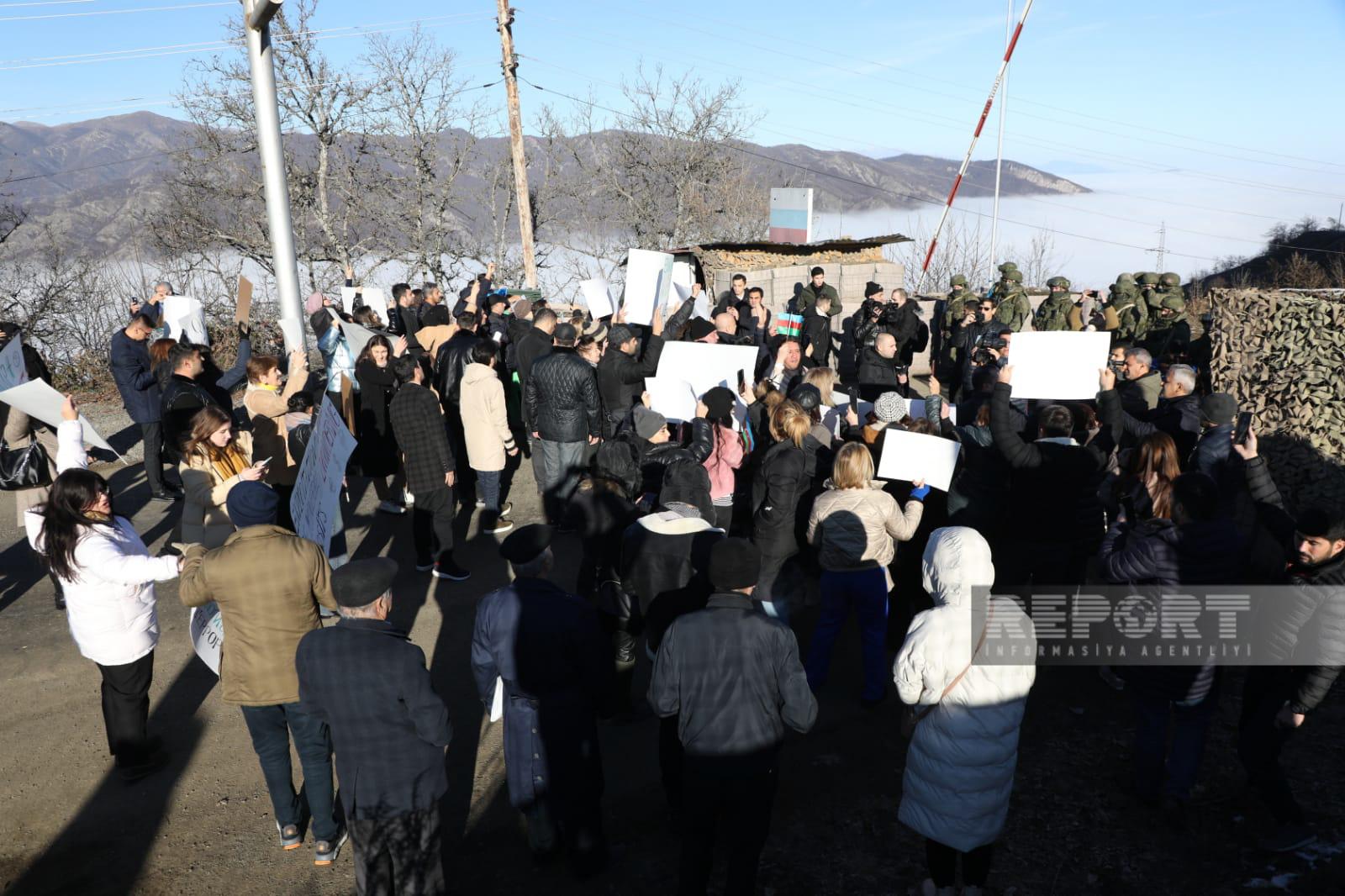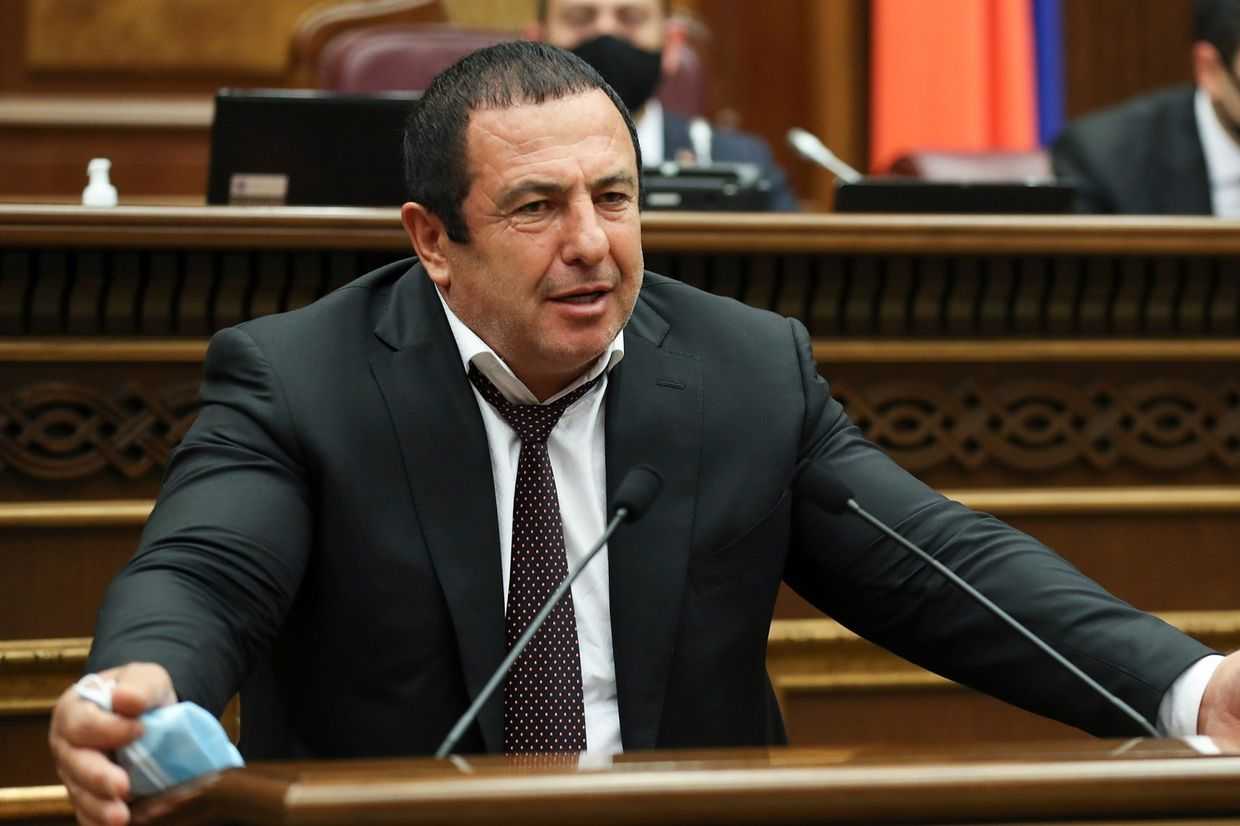
The Lachin corridor has been blocked since around 10:30 on 12 December, after Azerbaijani activists erected pavilions at its entrance near the city of Shusha (Shushi). Yerevan and Stepanakert have expressed concern and called on peacekeepers to respond.
This is the second time that traffic between Armenia and Nagorno-Karabakh has been suspended this month, with Azerbaijanis in civilian clothes previously blocking the road for three hours on 3 December.
The protesters, who have gathered in front of a Russian peacekeeping post, accused the peacekeeping forces stationed in the region of failing to allow Azerbaijani ecologists to monitor mining activity in Aghdara (Martakert). They demanded that the commander of the Russian peacekeeping forces, General Andrey Volkov, speak to them, and held placards condemning the inaction of the stationed peacekeepers.

Monitoring ‘illegal mining’
Azerbaijan’s Ministry of Foreign Affairs has repeatedly called on the Russian peacekeeping forces to allow Azerbaijani officials and specialists to enter the territory currently under the control of Russian peacekeepers to assess alleged mining activity, and for the peacekeepers to ‘prevent the illegal exploitation of natural resources’ in that territory.
Azerbaijan alleges that there has been illegal mining in the region, ‘especially in the Gizilbulag gold and Damirli copper-molybdenum deposits’, and claims that the mining has had negative ecological consequences.
[Read more on OC Media: Russia to open ‘mini customs checkpoint’ on Lachin Corridor]
Meetings were held between Azerbaijani state representatives and senior figures from the Russian peacekeeping force on 3 and 7 December, to discuss ‘the illegal exploitation of mineral deposits’ and the procedure for monitoring areas where natural resources are being extracted.
A monitoring visit by Azerbaijani specialists to mines in Aghdara region was agreed for 10 December, but did not take place as residents of the region and employees of the mining organisation gathered and blocked the entry of the group to the territory of the mines.
Nagorno-Karabakh’s official outlets reported that the action took place because the visit had not been agreed with the authorities in Stepanakert or the organisation operating the mines. Azerbaijani outlets maintain that the gathering was ‘pre-planned’.
On 11 December, the Ministry of Foreign Affairs of Azerbaijan sent a note to Russia, demanding ‘unobstructed access’ to the relevant areas, and describing any obstruction or conditions on such visits as ‘unacceptable’.
A ‘struggle for survival’
Armenian Prime Minister Nikol Pashinyan responded to the events by claiming that stopping the operation of the Lachin corridor ‘means to condemn the population of Nagorno-Karabakh to genocide in three scenarios’.
Speaking at the opening of the fourth Global Forum Against the Crime of Genocide, he went on to describe the three scenarios. The first was the depopulation of Nagorno-Karabakh, the second based on loss of identity due to Azerbaijan ‘waging a struggle against Nagorno-Karabakh toponyms [and] historical and cultural monuments’, and the third was ‘the actual physical annihilation’ of the Armenian population of Nagorno-Karabakh.
However, Pashinyan also emphasised that ‘dialogue and cooperation’ between Baku and Stepanakert were ‘the most important tools for preventing genocide’.
Armenia’s ambassador at-large Edmon Marukyan called the road’s closure a ‘gross violation’ of the 2020 ceasefire agreement between Armenia, Azerbaijan, and Russia.
President of Nagorno-Karabakh Arayik Harutyunyan accused the Azerbaijani protesters of blocking the road on the basis of ‘false and fake reasons’, and claimed that Azerbaijan was ‘seeking ethnic cleansing and deportation of the population’.
He also expressed his hope that the Russian peacekeepers would act ‘as a guarantor of our […] road safety, will use all tools to prevent such provocations and violations of agreements’.
The Parliament of Nagorno-Karabakh also issued a statement calling on Russian peacekeepers to ‘to prevent similar anti-human actions by the Azerbaijanis with the toughest measures’.
‘We appeal to the citizens of the Republic of Artsakh [Nagorno-Karabakh] to show restraint, to be vigilant in order to prevent any provocative actions of Azerbaijanis with joint efforts. Our people, who have overcome many difficulties during their struggle for survival, will face current and future challenges again this time’, the statement read.
For ease of reading, we choose not to use qualifiers such as ‘de facto’, ‘unrecognised’, or ‘partially recognised’ when discussing institutions or political positions within Abkhazia, Nagorno-Karabakh, and South Ossetia. This does not imply a position on their status.






